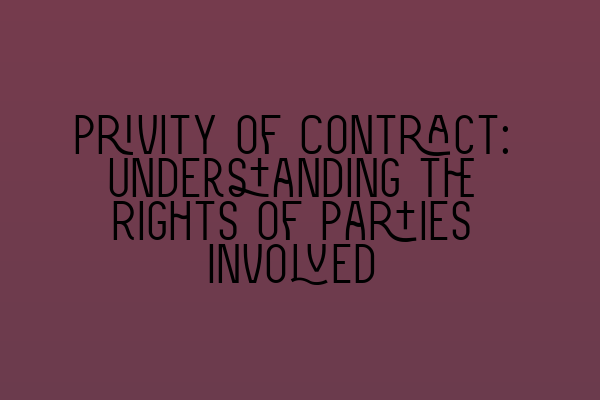Privity of Contract: Understanding the Rights of Parties Involved
In the world of contract law, the concept of privity of contract plays a crucial role in determining the rights and obligations of the parties involved. Privity of contract refers to the relationship that exists between the parties who have entered into a contract, and it determines who has the right to enforce the terms of the contract and who can be held liable in case of a breach.
Why is Privity of Contract Important?
Understanding privity of contract is critical for both lawyers and individuals involved in contractual agreements. It shapes the legal landscape and defines the boundaries of contractual rights and duties.
At its core, privity of contract ensures that rights and obligations under a contract are only enforceable by the parties who are deemed to have a direct relationship with each other. In other words, it prevents third parties from interfering in a contract or seeking remedies for non-compliance.
For example, imagine you have entered into a contract with Company A to deliver a product by a certain date. If Company B, a third party, interferes with the delivery or breaches the terms of the contract, you cannot hold them liable or seek remedies against them unless they were a party to the original contract. Privity of contract protects the integrity and intentions of the original parties involved.
Exceptions to Privity of Contract
While privity of contract is a fundamental principle, there are certain exceptions where a third party may be able to enforce the terms of a contract or be held liable. These exceptions arise through various legal doctrines and statutes, and they serve to balance the interests of justice and fairness in specific circumstances.
One such exception is the doctrine of collateral contracts. This doctrine allows a third party who has entered into a separate agreement with one of the contracting parties to enforce the terms of the original contract. For example, if you are the beneficiary of a life insurance policy taken out by your spouse, you may be able to enforce the contract against the insurance company.
Another exception is the doctrine of promissory estoppel. This doctrine prevents a party from going back on a promise made to a third party, even in the absence of a formal contract. If a party has relied on a promise to their detriment, the law may enforce the promise to prevent injustice. This is often the case in situations where a party has made a charitable donation in reliance on a promise of matching funds.
Recent Developments in Privity of Contract
Over time, privity of contract has undergone certain developments as legal systems adapt to changing societal needs and expectations. In some jurisdictions, legislative reforms have been introduced to allow for greater protection of third-party rights.
For example, in the United Kingdom, the Contracts (Rights of Third Parties) Act 1999 provides third parties with the right to enforce the terms of a contract if the contract expressly grants them that right. This allows for greater flexibility and recognition of the changing nature of business relationships.
It is essential for solicitors and legal professionals to stay up to date with these recent developments and understand how they may affect their clients and the contracts they draft and negotiate. By keeping abreast of the changing landscape, solicitors can provide the best possible advice and protect their clients’ interests.
Conclusion
Privity of contract is a fundamental concept in contract law, governing the rights and obligations of parties involved in contractual agreements. While it generally restricts the enforcement of contracts to the parties themselves, there are exceptions that allow certain third parties to benefit from or be held liable under a contract. As legal professionals, it is crucial to have a comprehensive understanding of privity of contract, as well as the exceptions and recent developments in this area of law.
If you’re interested in learning more about other important aspects of contract law and legal practice, check out these related articles:
- Mentorship for Aspiring Solicitors: Nurturing Talent in the Legal Field
- Exploring Alternative Dispute Resolution: An Effective Approach to Legal Conflicts
- The Art of Contract Drafting and Negotiation: Skills Every Solicitor Should Master
- Navigating the Legal Practice Course (LPC): Your Path to Solicitor Qualification
- Mastering Client Care Skills: Essential for Solicitors
